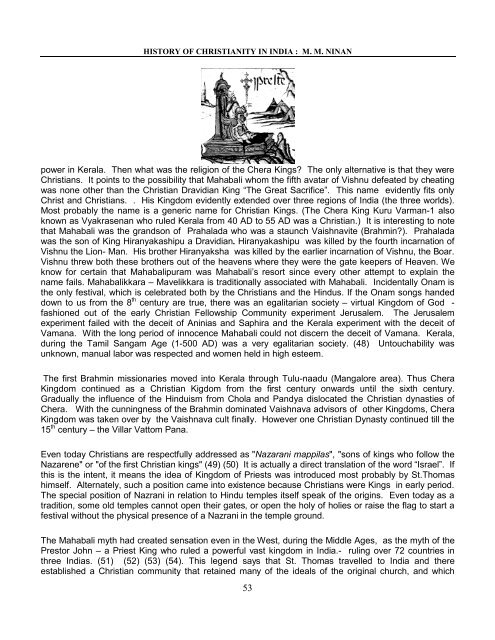Indian Christianity
You also want an ePaper? Increase the reach of your titles
YUMPU automatically turns print PDFs into web optimized ePapers that Google loves.
HISTORY OF CHRISTIANITY IN INDIA : M. M. NINAN<br />
power in Kerala. Then what was the religion of the Chera Kings? The only alternative is that they were<br />
Christians. It points to the possibility that Mahabali whom the fifth avatar of Vishnu defeated by cheating<br />
was none other than the Christian Dravidian King “The Great Sacrifice”. This name evidently fits only<br />
Christ and Christians. . His Kingdom evidently extended over three regions of India (the three worlds).<br />
Most probably the name is a generic name for Christian Kings. (The Chera King Kuru Varman-1 also<br />
known as Vyakrasenan who ruled Kerala from 40 AD to 55 AD was a Christian.) It is interesting to note<br />
that Mahabali was the grandson of Prahalada who was a staunch Vaishnavite (Brahmin?). Prahalada<br />
was the son of King Hiranyakashipu a Dravidian. Hiranyakashipu was killed by the fourth incarnation of<br />
Vishnu the Lion- Man. His brother Hiranyaksha was killed by the earlier incarnation of Vishnu, the Boar.<br />
Vishnu threw both these brothers out of the heavens where they were the gate keepers of Heaven. We<br />
know for certain that Mahabalipuram was Mahabali’s resort since every other attempt to explain the<br />
name fails. Mahabalikkara – Mavelikkara is traditionally associated with Mahabali. Incidentally Onam is<br />
the only festival, which is celebrated both by the Christians and the Hindus. If the Onam songs handed<br />
down to us from the 8 th century are true, there was an egalitarian society – virtual Kingdom of God -<br />
fashioned out of the early Christian Fellowship Community experiment Jerusalem. The Jerusalem<br />
experiment failed with the deceit of Aninias and Saphira and the Kerala experiment with the deceit of<br />
Vamana. With the long period of innocence Mahabali could not discern the deceit of Vamana. Kerala,<br />
during the Tamil Sangam Age (1-500 AD) was a very egalitarian society. (48) Untouchability was<br />
unknown, manual labor was respected and women held in high esteem.<br />
The first Brahmin missionaries moved into Kerala through Tulu-naadu (Mangalore area). Thus Chera<br />
Kingdom continued as a Christian Kigdom from the first century onwards until the sixth century.<br />
Gradually the influence of the Hinduism from Chola and Pandya dislocated the Christian dynasties of<br />
Chera. With the cunningness of the Brahmin dominated Vaishnava advisors of other Kingdoms, Chera<br />
Kingdom was taken over by the Vaishnava cult finally. However one Christian Dynasty continued till the<br />
15 th century – the Villar Vattom Pana.<br />
Even today Christians are respectfully addressed as "Nazarani mappilas", "sons of kings who follow the<br />
Nazarene" or "of the first Christian kings" (49) (50) It is actually a direct translation of the word “Israel”. If<br />
this is the intent, it means the idea of Kingdom of Priests was introduced most probably by St.Thomas<br />
himself. Alternately, such a position came into existence because Christians were Kings in early period.<br />
The special position of Nazrani in relation to Hindu temples itself speak of the origins. Even today as a<br />
tradition, some old temples cannot open their gates, or open the holy of holies or raise the flag to start a<br />
festival without the physical presence of a Nazrani in the temple ground.<br />
The Mahabali myth had created sensation even in the West, during the Middle Ages, as the myth of the<br />
Prestor John – a Priest King who ruled a powerful vast kingdom in India.- ruling over 72 countries in<br />
three Indias. (51) (52) (53) (54). This legend says that St. Thomas travelled to India and there<br />
established a Christian community that retained many of the ideals of the original church, and which<br />
53


















